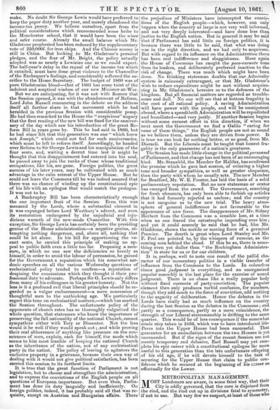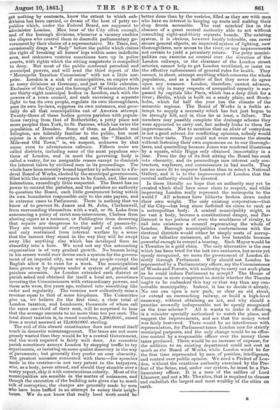METROPOLITAN MANAGEMENT. lur 0 S T Londoners are aware, in
some faint way, that their . City is oddly governed, that the core is disjoined from the rind, and the rind cut up in divisions fatal to symmetry, if not to use. But very few we suspect, at least of those who get nothing by contracts, know the extent to which sub- division has been carried, or dream of the host of petty re- publics which, under the Federal Board, are supposed to administer London. Men hear of the City often enough, and of the borough divisions, whenever a vacancy enables the cliques who control them to discredit parliamentary go- vernment by their choice of a representative. Mr. Train, too, occasionally drags a "Body" before the public which claims the right of breaking all horses' legs within some indefinite area, and unknown vestries sometimes turn up in police courts, with rights which the Bitting magistrate is compelled to deny. But most of the public confound parochial and municipal powers, and will read the third report of the "Metropolis Taxation Commission" with not a little sur- prise. London is a sink of municipalities, an empire with as many divisions as Germany, and just as little cohesion. Exclusive of the City and the borough of Westminster, there are thirty-eight municipal bodies in London, each with the powers of a town council, and each exercising a separate right to tax its own people, regulate its own thoroughfares, pass its own by-laws, suppress its own nuisances, and gene- rally do all that municipalities out of America attempt. Twenty-three of these bodies govern parishes with popula- tions varying from that of Rotherhithe, a petty place not more peopled than York, to St. Pancras, which has twice the population of Dresden. Some of them, as Lambeth and Islington, are tolerably familiar to the public, but most rejoice in a decent obscurity, and one, the "Hamlet of Mile-end Old Town," is, we suspect, unknown by that name even to adventurous cabmen. Fifteen more are called districts, including some of the most populous sec- tions of London, and in most the governing body is called a vestry, for no assignable reason except to diminish the interest taken by civilized men in its proceedings. The whole have been recently bound together by adhesion to a Fe- deral Board of Works, elected by the municipal governments, filled with the noisiest vestrymen to be found, and, like most federations, exceedingly little respected. The Board has no power to control the parishes, and the parishes no authority to question the Board, each little government being within its own boundaries responsible only to the rate payers, and in extreme cases to Parliament. There is nothing that we know of to prevent St. James and St. John, Clerkenwell, from surrounding themselves with a wall, or St. Luke from announcing a policy of strict non-intercourse, Chelsea from abating cigars as a nuisance, or Paddington from decreeing that repairs are dangerous to the safety of passers-by. They are independent of everybody and of each other, and only restrained from internal warfare by a sense that the instant they stand in the way they will be swept away like anything else which has developed from an absurdity into a bore. We need not say this astounding organization is of very gradual growth. No human being in his senses would ever devise such a system for the govern- ment of an imperial city, nor would any people except the English allow it to exist for a week. The municipalities have grown up by degrees under a system of gradual and painless secession. As London extended each district or parish asked and obtained for itself a local act, sometimes investing the Commissioners with extraordinary powers, and these acts were five years ago, -reduced into something like order and regularity. The vestries now collectively raise a revenue equal to that of some kingdoms. The Committee give us, we believe for the first time, a clear total of London taxation, and Londoners, thousands of whom call the rates one-third of their rent, will be surprised to hear that the average amounts to no more than ten per cent. The total direct taxation is, in round numbers, 1,200,0001., raised from a rental assessed at 12,000,000/. sterling.
The evil of this absurd constitution does not reveal itself much in domestic mismanagement. The taxes are not more grossly wasted than they would be by a central Government, and the work required is fairly well done. An eccentric parish sometimes annoys London by stopping traffic to try experiments, or insisting on some quaint discovery in the way of pavements ; but generally they prefer an easy obscurity. The greatest nuisance connected with them—the speeches made in the vestries—is not very patent to the taxpayers, who, as a body, never attend, and should they stumble over a vestry report, skip it with conscientious celerity. Most of the municipalities are sensible in the matter of nuisances, and though the execution of the building acts gives rise to much talk of corruption the charges are generally made by men who have been baked in an attempt to annoy their neigh- bours. We do not know that really local work could be better done than by the vestries, filled as they are with men who have an interest in keeping up rents and making their shop fronts accessible. The real mischief lies in the absence of a great central authority able to act without consulting eight-and-thirty separate boards. The existing system, it is obvious, however locally tolerable, can never secure general objects, an improved system of lighting, new thoroughfares, new access to the river, or any improvements not certain to yield a pecuniary return. The petty munici- palities can exercise no control over the direction of the London railways, or the clearance of the London street arteries, cannot help to get London ventilated, or insist on the effective enforcement of general rules for health. They cannot, in short, attempt anything which concerns the whole population, and as a matter of fact they never do agree upon any, measure. London, therefore, cannot advance, and a city in many respects of unequalled capacity is sur- passed by capitals like Paris, which has a deep ditch for a river; Berlin, which is built on a sandy plain; and Stock- holm, 'which foi half the year has the climate of the antarctic regions. The Board of Works is a feeble at- tempt to supply a necessity which has but just begun to be strongly felt, and is, thus far at least, a failure. The members may possibly complete the drainage scheme they were appointed to carry out, but nobody looks to them for improvements. Not to mention that an elixir of vestrydom is not a good solvent for conflicting opinions, nobody would trust their taste. They could not even rename the streets without fastening their own cognomens on to our thorough- fares, and quarrelling because Jones was rendered illustrious by a square, while Higgs only obtained immortality in a lane. From the day of its first sitting the Board has sunk into obscurity, and its proceedings now interest only con- tractors, wayfarers, and connoisseurs in bad smells. They are no more fit to improve London than to select a National Gallery, and it is to the improvement of London that the central authority should be devoted.
Is there literally no hope that an authority may yet be created which shall have some claim to respect, and while improving London really represent the metropolis to the world ? All schemes have hitherto broken down under their own weight. The only existing corporation—that of the City—has long since forfeited its claim to rank as a metropolitan body. A central municipality might, in so vast a body, become a constitutional danger, and Par- liament is too jealous of even the semblance of rivalry, to call into existence a council representing the whole of London. Borough municipalities conterminous with the electoral districts would either be simply nests of corrup- tion or talkative nuisances„ all the less bearable because powerful enough to compel a hearing. Each Mayor would be a Thwaites in a gold chain. The only alternative is the one which has been tried for the last two centuries, but never yet openly recognized, we mean the government of London di- rectly through Parliament. Why should not London be represented by a Parliamentary officer, say the Commissioner of Woods and Forests, with authority to carry out such plans as he could induce Parliament to accept? The House of Commons is more competent to decide'whether the Thambs ought to be embanked this way or that way than any conk ceivable municipality. Indeed, it has to decide it already. No one can open a new park, or clear an old street, or extend an encroaching railway, or build a high-level causeway, without obtaining an act, and why should a practice avowedly indispensable not be openly recognized as the true scheme ? All it wants to make it effectivek is a minister specially authorized to watch the plans, and suggest the improvements, and see that the money voted was fairly bestowed. There would be no interference with representation, for Parliament taxes London now for strictly municipal purposes, and the only change would be an effec- tive control by a responsible officer over the money those taxes produced. There would be no increase of expense, for the addition to an existing department could not cost as much as the Board of Works, while London would be for the first time represented by men of position, intelligence, and control over public opinion. We need a Prefect of Lon- don, without the vexatious authority exercised by the Pre- fect of the Seine, and, under our system, he must be a Par- liamentary officer. It is a man of the calibre of Lord Llanover, and not a Mr. Thwaites, that is required to cleanse and embellish the largest and most wealthy of the cities on earth.































 Previous page
Previous page